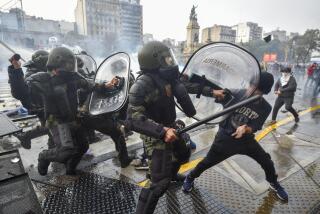Labor Movement Stages Strike Against Argentine Government
- Share via
BUENOS AIRES — Argentina’s labor movement crippled factories and commuter train service Monday in its first general strike against President Carlos Saul Menem’s administration.
The union show of force reflected worrisome signs for Menem’s largely successful economic policies. The one-day strike also underscored a growing power struggle between Menem and the labor movement, which helped elect him in 1989. Unions bitterly oppose proposed labor reform that officials say is needed to hold down industrial costs and maintain economic stability.
The DYN news service reported that the strike paralyzed all but one commuter train line in Buenos Aires, although most buses appeared to be operating. Some buses were pelted with rocks, but no injuries were reported. DYN reported heavy reductions of factory work forces in Buenos Aires and other industrial cities. The Labor Ministry acknowledged that 60% of the workers in the Buenos Aires industrial belt stayed off the job.
While union leaders called the strike a success, Menem declared it “an utter failure” and said, “The omnipotence of the labor leadership has ended in Argentina.”
Menem, a member of the labor-based Justicialist (Peronist) Party, won the 1989 election with strong union support. But he has imposed policies opposed by unions, including the privatization of government enterprises and a freeze on salary increases without increased productivity. The buying power of salaries and retirement pensions has sunk to painfully low levels, a source of increasing discontent.
Domingo Cavallo, Menem’s economy minister, has brought inflation down from 1,340% in 1990 to an expected 18% this year. Cavallo’s anti-inflation strategy has included holding the exchange rate to one peso to the U.S. dollar. But while inflation has dropped, it continues to make the peso increasingly overvalued. That makes Argentine exports less competitive overseas and gives imports an advantage on the domestic market.
As a result, trade surpluses in the billions of dollars have evaporated; this year the country expects a deficit of more than $1 billion. A continuing deficit could threaten Argentina’s healthy economic growth rate, estimated at 5.5% for this year.
Economist Nora Marcela Cristini said the government needs to help Argentine industries make even further reductions in production costs. She said the only way to do that is labor reform.
Menem has been unable to win enough support to pass a labor reform bill in the Congress, but he could use emergency powers to impose it. The proposed labor reform would “disarm” the union movement, Cristini said. But Monday’s strike indicated that unions will defend their powers with political action.
More to Read
Sign up for Essential California
The most important California stories and recommendations in your inbox every morning.
You may occasionally receive promotional content from the Los Angeles Times.













